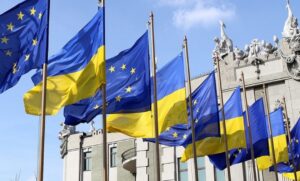
European Commission Executive Vice President Valdis Dombrovskis says the European Commission has reached agreements in principle with Bulgaria, Hungary, Poland, Romania and Slovakia on the export of Ukrainian agricultural products.
“There are agreements,” he wrote in capital letters on his Twitter page Friday.
Dombrovskis said the European Commission reached “an agreement in principle with Bulgaria, Hungary, Poland, Romania and Slovakia regarding Ukrainian agri-food products.” “Together with Janusz Wojciechowski (European Commissioner for Agriculture) we have taken measures to solve the problems of both farmers in neighboring EU countries and in Ukraine,” he wrote.
The Vice President also named the key elements of the deal, which were also agreed with Ukraine. These elements include the removal of unilateral measures by Poland, Slovakia, Bulgaria and Hungary. Then there are “exceptional safeguard measures for 4 products: wheat, corn, rapeseed, sunflower seeds and a support package of 100 million euros for affected farmers in 5 member states.
In addition, Dombrovskis reported on the investigation of some other products, including sunflower oil.
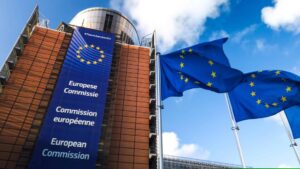
The European Commission is launching a new European Bauhaus capacity building program to assist municipalities in the reconstruction and rehabilitation of Ukraine.
The European Commission said Thursday that the decision follows several events, including a meeting between Commission members and the Ukrainian government in Kiev on February 2, the EU-Ukraine summit on February 3, and the visit of European Commissioner Virginius Sinkevicius to Kiev on February 16-17.
“The program will be launched in the afternoon during a high-level meeting with Commissioner Virginijus Sinkevičius. The capacity building initiative aims to inspire and provide practical assistance to municipalities involved in the reconstruction and rehabilitation of Ukraine,” the European Commission explained the essence of the initiative.
It is also reported that the program is organized by and with Ukrainian partners, such as Ro3kvit, ReThink, Covenant of Mayors East and the Council of Architects Europe. The president of the European Commission, Ursula von der Leyen, and commissioners Maria Gabriel and Elisa Ferreira will take part in the event through a video address.
Commenting on the event, European Commission President Ursula von der Leyen said: “We will rebuild Ukraine. We must, and we will. The reconstruction that Ukraine deserves should be done in the spirit of the New European Bauhaus (NEB). Urban planners, architects, engineers are involved in the project, and the concept of the NEB will inspire them. Our vision is to turn the destruction of war into opportunities to build a beautiful and healthy future for Ukraine.
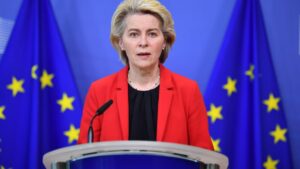
President of Ukraine Volodymyr Zelenskyy has discussed with President of the European Commission Ursula von der Leyen progress in Ukraine’s implementation of the recommendations of the European Commission.
During a call with von der Leyen we condemned today’s Russia’s missile attacks. Welcomed new package of sanctions and agreed on further pressure on Russian aggressor,” he said on Twitter Thursday.
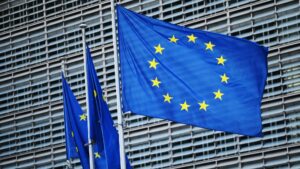
The European Commission on Wednesday proposed to introduce another – ninth – package of sanctions against Russia, which should include a ban on transactions with three Russian banks and other measures.
According to a statement from EC Chairwoman Ursula von der Leyen, the EU executive body proposes as part of the new package of measures to include about 200 more individuals in the sanctions lists, to introduce a ban on transactions with three Russian banks, including the All-Russian Bank of Regions Development, as well as the broadcasting of four Russian media channels.
Von der Leyen’s proposals also include a ban on the export of unmanned aerial vehicles to Russia. In addition, the EC wants to impose new export restrictions, in particular on dual-use goods – “key chemicals, neuroparalytic substances, electronics and IT components.
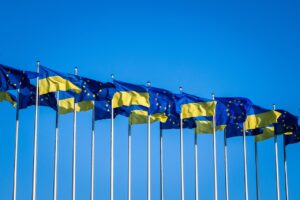
The European Commission (EC) approved on Tuesday the Horizon Europe work program for 2023-2024 to allocate about 13.5 billion euros to support researchers and innovators in Europe.
It is about finding “breakthrough solutions to environmental, energy, digital and geopolitical problems.”
“As part of the broader €95.5 billion EU Horizon Europe research and innovation program, funding for 2023-2024 will support the EU in achieving its climate goals, building resilience and developing basic digital technologies,” the European Commission said in a communiqué published in Brussels.
The document said it would also “consider targeted actions to support Ukraine, build economic resilience and promote sustainable recovery from the COVID-19 pandemic.”
Brussels explained that the targeted assistance to Ukraine is in addition to the 70 million euros earmarked for special measures already initiated in 2022. The additional support foresees the enhancement of access of Ukrainian scientists to European research infrastructures, continuation of the assistance to Ukrainian medical scientists, assistance in the struggle against climate change and assistance in reconstruction of several Ukrainian cities with the participation of the EU mission on climate-neutral and “smart” cities.
The EC communiqué also notes that over 42% of the 2023-2024 work program budget, or €5.67 billion, is earmarked for climate change and digital transformation projects. Some 970 million euros will be invested “to accelerate the transition to clean energy in line with the European REPowerEU plan and increase Europe’s energy independence.

The European Commission (EC) on Tuesday proposed a new strategy for the further development of the European drone market.
“The new strategy explains how Europe can carry out large-scale commercial drone operations while offering new opportunities in the sector,” according to an EC communiqué published in Brussels.
The document notes that “thanks to the EU’s comprehensive regulatory framework, drones have been flying safely in European skies for hundreds of thousands of hours, for example to survey infrastructure, monitor oil spills or take soil samples.
The EU has also been successful in developing projects to use drones in medicine, such as transporting medical samples between health services.
Brussels has announced that the introduction in January 2023 of “the world’s only European U-space secure drone traffic control system” will lay the groundwork for expanding the types of operations that use them.
But before promoting these innovative technologies, the European Commission wants to make sure that society supports this type of air transport, the EC document said. Therefore, the new strategy calls on national, regional and local municipalities to ensure that drone services meet the needs of citizens, including addressing issues such as noise, safety and privacy in the use of the machines.
The strategy foresees that by 2030 the following drone services will be an integral part of European life: emergency services, mapping, imaging, inspection and surveillance by civilian drones within the scope of current legislation, and the delivery of small consignments of urgent supplies such as biological samples or medicines.
The strategy looks ahead to innovative aerial mobility services such as air cabs, which provide regular passenger transportation, initially with a pilot on board, but with the ultimate goal of fully automated operations, according to an EC communiqué.